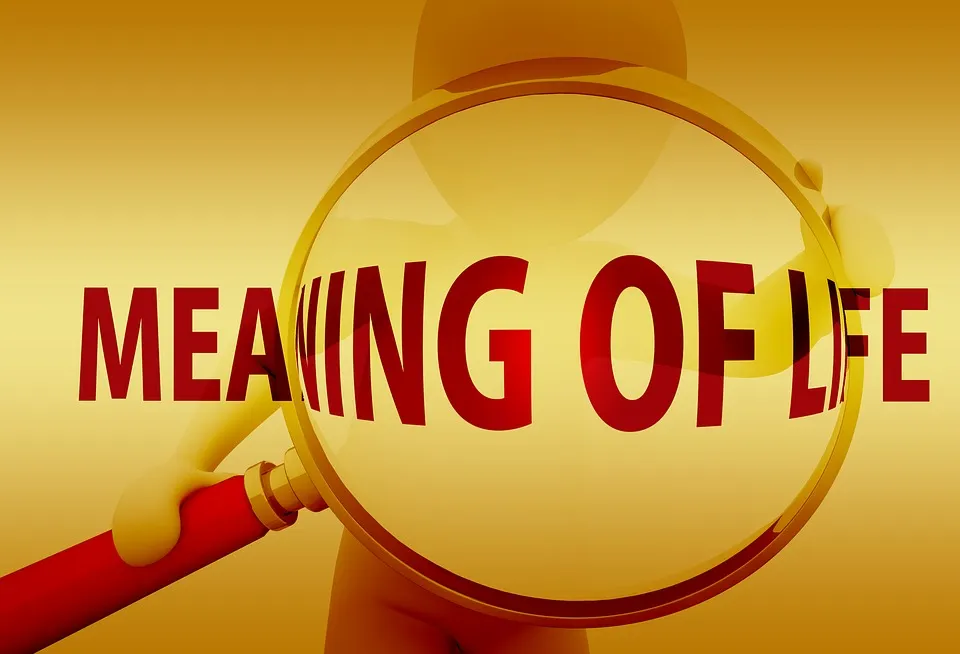What is the meaning of life? You have probably asked yourself this question and it’s a question that pops up now and again, there's even a movie called “The meaning of life”. Some say the answer is to be as happy as possible, in fact, I think a lot of people, at least in Sweden, where I’m from, think that’s the answer. I think that’s wrong, I think there is more to life than being happy. The answer is hidden in the question itself. The reason we ask the question is that we crave meaning, we need it, why do anything if there is no point in doing it? Why try hard if it’s impossible or if it won't make any difference? Why live if your life is without meaning? We need to be motivated by something otherwise we won’t take action. Some people might think being as happy as possible is the answer but chasing happiness can actually make people less happy. 
If you want to find meaning in your life you have to look for it, you have to think about it. Maybe you thought that you knew the answer but you still feel anxious, without direction or purpose? Then you probably need to keep looking. Maybe there is something else that can give you a sense of meaning? Maybe you don't need to discard the thing/goal that you thought was the meaning of your life perhaps you just need to add something?
The four pillars of meaning
What prompted me to write this post was listening to the podcast There's more to life than being happy. In it, Emily explains that there are four pillars of a meaningful life and that we all can live meaningfully if we build some or all of these pillars into our lives.
1. Belonging is the most essential source of meaning for a lot of people. It arises from loving relationships, like family, friends, and partners where you are valued for who you are and where you also value others. Emily explains that belonging springs from love and that it is a choice. If you want belonging you have to cultivate it with others.
2. Purpose, purpose is more about what you can give and less about what you want. To find purpose think about how you can use your strengths to serve others, having and raising children is something that gives a lot of people purpose. Maybe your purpose is to come up with a great idea or find a solution to a problem? Maybe it's helping to spread an idea or a set of ideas?
3. Transcendence, transcendent states are those rare moments when you rise above the unimportant little things that keep you busy in life, your sense of self fades away and you feel connected to a higher reality. It could be when you are dancing or playing an instrument and you feel like you’re “in the zone”. It could also be in the form of a religious experience, meditation or during the use of psychedelics. You can lose all sense of time and space during a transcendent state.
4. Storytelling is the fourth pillar, it is the story about you, and you are the one telling it to yourself. This story is a summation of your past and who you are. It can be told in many different ways and it’s never the whole story sense memories aren’t perfect and it would take far too long time to tell it all. You can edit your story, emphasize different parts and interpret them in many ways. If you have a story that goes something like, everything was good, now it’s bad, you will tend to be more anxious and depressed. If your story is about love, growth or becoming a better person, you have a greater chance of living a meaningful life. By reflecting on your life, alone or with the help of a therapist and thinking about how the defining moments shaped you, you can change your story. This process will take a long time and it could be painful.
Why we should build these pillars into our lives
According to Emily, studies show that people who have meaning in life are more resilient, do better in school and at work, and they even live longer. The four pillars of meaning can be used by strong communities to give people something to live and die for. This goes for good as well as bad communities. It’s important that we facilitate these pillars in our own lives, in our families, tribes/communities, societies, and the world at large, in that order, from the ground up. If we don't offer good alternatives a lot of people will end up in bad relationships, cults, criminal or terrorist organizations, political parties, ideologies and so on. Sometimes, instead of valuing you for who you are, you’re valued for agreeing with a particular idea, blindly obeying commands, being from the same geographic location, cheering for the same team, belonging to the same ethnic group or for hating the same group or idea.
So, I suggest we strive towards personal growth, cultivate authentic relationships, network and build tribes or communities locally or online. Think about what your strengths are, what can you offer people? Try meditating or do the thing that gets you in the zone. Think about your story, how did you become who you are today? Does your story make you anxious or depressed? Maybe you need to change your story? Living a meaningful life is an ongoing process and it requires work. Every day we add to our story. Think about what's important to you, what’s the meaning of your life?